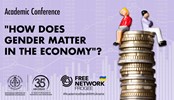Jesper Roine discusses why inequality matters
In this interview, we delve into the complex dynamics and far-reaching consequences of economic inequality in our society. Jesper Roine, Deputy Director of the Stockholm Institute of Transition Economics (SITE), sheds light on the causes, manifestations, and intersections of wealth inequality in his latest book release “Why inequality matters”, offering profound insights into its impact on individuals, communities, and the overall fabric of society.
Jesper Roine who has extensively researched and written about the pressing issue of economic inequality since the late 1990s, launched his new book “Why inequality matters” (Original title in Swedish: “Därför är ojämlikheten viktig”) on August 21, 2023. Through Jesper's expertise, he shares a deeper understanding of the various factors that contribute to inequality and how we are to understand recent developments. The book explores the consequences of inequality, how it affects social mobility, opportunities, and overall economic stability.
Jesper tell us about your understanding of economic inequality, and why do you think it is an important issue?
Fundamentally economics is about human welfare. This means that the (economic) values we create in society should translate into this. It should be obvious that social welfare depends both on the size of the total and on the distribution of this total.
From a less theoretical viewpoint questions about inequality are also everywhere in political debates and discussions about policy. To follow or to participate in these discussions it is important to understand, what is referred to—inequality can have multiple meanings—what is true in terms of the facts, as well as how inequality comes about and what impacts it can have on future developments.
Are there any misconceptions or myths about inequality that you would like to dispel?
There are many. One is that questions about inequality are always normative, and even worse, that they therefore do not belong in economics because they are ultimately about value judgements rather than “facts”. First of all, it is, of course, possible to know facts about the distribution of economic resources in society and how they evolve. Such facts are important for all sorts of evaluations regardless of what normative stance one has. But furthermore, economic inequality also impacts on the functioning of the economy in numerous ways, both directly through markets, but importantly also indirectly through political effects.
Can you tell us more about the major factors contributing to inequality in our society based on your research about inequality?
There are several channels, and I discuss many in the book, but if I should mention a few key factors that have been influential over the past decades one would be how technology and globalization have had disproportionately favored some types of “skills” over others and also magnified the economic consequences of differences in these skills. Another would be the higher growth rate in asset values as compared to the economic growth rate. This has been especially marked in Sweden where the ratio of private wealth to private disposable income has grown substantially.
Lastly, why should people read your book?
The book is for everyone who wants to understand debates and discussions about economic inequality in society, from issues regarding global inequality all the way down to nitty-gritty details about the recent developments in Sweden. What I try to do is to provide an overview of these different levels and how they are connected, based both in empirics and in the theoretical ideas that have been put forward to explain what we observe. The book also ends with some speculation about what we can expect in the future if we extrapolate based on the different theories. If these sound-like interesting issues, then this is a book for you.

Photos from Jesper Roine's book launch on 22 August, 2023.
Photo: Peter Cederling




